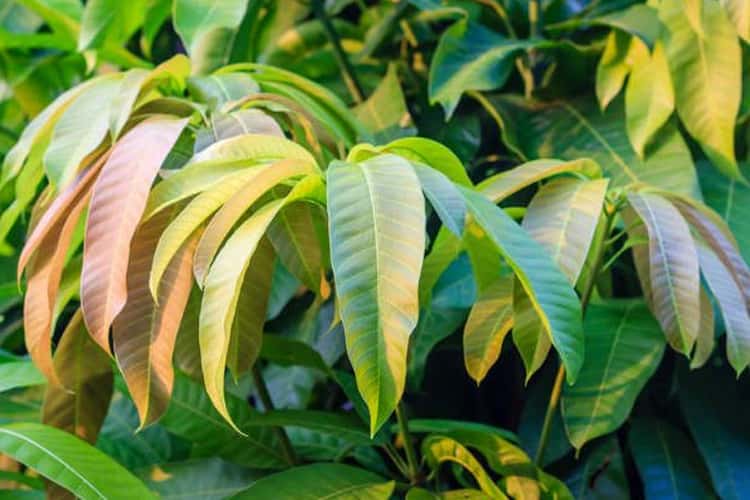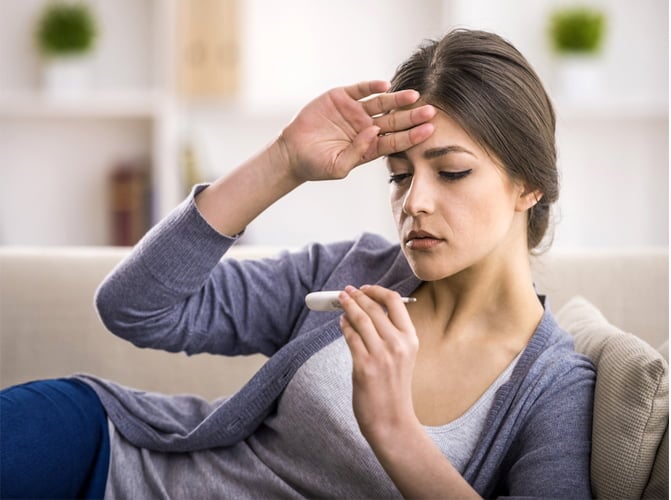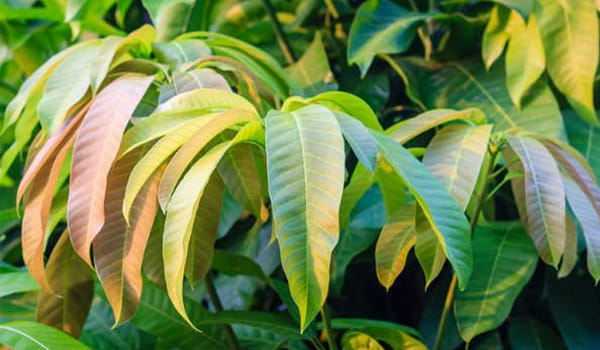Throughout history, every part of the mango, including its skin, leaves, bark, or pit, has been used as a health remedy. But before going into all things mango, nutrition is the backdrop for the sweet and delicious fruit and the benefits related to it.

Source: spicespoint.in
Benefits Of Mango For Health:
Mango is an oval-shaped, juicy, creamy, and fleshy tropical fruit, which has a distinct outer fleshy part with a seed inside. With a flavor often similar to peach and pineapple, mango is a fruit that grows extensively in the tropical regions. Mangoes can vary in skin color-green, red, yellow, and orange.
The popularity of mangoes grew, and today, mangoes are known to be the most consumed fruit in the world. In short, mangoes are fruits that can be also termed as nutritional powerhouses.
While many are aware of the amazing benefits of mangoes, there are only few who know about the benefits of the mango leaves.
Mango leaves are packed with medicinal and healing properties. You can check out the uses of mango leaves, its benefits, and nutritional facts below.
Nutritional Benefits Of Mango Leaves:
Here are the nutritional benefits of mango leaves:
- Vitamin A, B, C
- Flavonoid
- Phenol contents
- Niacin
- Beta-carotene
- Thiamine
- Riboflavin
- Phytonutrients
Mango Leaves Benefits:
Mango leaves turn red or purple when tender and sometimes dark green color with a pale underside. It’s leaves are rich in Vitamin A, B, and C. They also have a rich content of several other nutrients. Mango leaves have effective antioxidant agents and high content of flavonoid and phenols.
Here are the benefits of mango leaves:
1. Cure Diabetes:
Mango leaves cure diabetes. Several studies have been linked to the lowering of blood sugar among obese adults. Other studies also indicate effective blood sugar management as well as glycemic control with mango consumption.
The tender leaves of the mango tree contain tannins known as anthocyanidins, which help in treating early stages of diabetes. The leaves are dried and powdered and used as an infusion to treat diabetes. It can also be used for treating angiopathy and diabetic retinopathy.
Soak the leaves in a cup of water overnight. Strain and drink the mixture to help relieve the symptoms of diabetes. It can also help in treating hyperglycemia. The leaves also contain a compound known as 3beta-taraxerol and ethyl acetate extract, which are mixed with insulin to activate GLUT4 and stimulate the synthesis of glycogen.
2. Vascular Disease:
Diabetes can lead to various complications including eye problems. Mango leaves contain tannins, which are known as anthocyanins. The mango leaf tea is also beneficial for treating diabetic rhinopathy and other vascular apathy.
3. Blood Pressure and Anxiety:
There are millions of people affected by high blood pressure every year and one in every three adults does not have their blood pressure in control.
Mango leaves have compounds that give a calming effect on the nervous system and reduces anxiety and restlessness.
You can add two to three cups of mango tea to water for bathing and feel your senses rejuvenate. In addition, blood pressure can also be controlled by sipping tea leaves.

Source: oneboxhosting.com
4. Varicose Veins and Hypertension:
Brewed mango tea is greatly helpful for treating varicose veins. It can be prepared by boiling young mango leaves in water until it changes color. Tea works by making the delicate blood vessels stronger. You can add two tsp of fruit juice like guava, mango, and papaya to a cup of tea for faster results. Hypertension can also be relieved if blood vessels are functioning well.
5. Asthma, Bronchitis and Cough:
Respiratory problems can be effectively treated with brewed mango leaves. If you suffer from whooping cough, you can sip the decoction of mango leaves. Add honey to the tea to comfort a sore throat and protect from overstraining the throat.
8. Treat Burns:
To treat burns on the skin and scalds, burn a handful of mango leaves. Apply the ash to the affected area for instant relief.
9. Relief from an Earache:
Earache can be troublesome. For a quick relief, try this homemade remedy. One tsp of extracted mango leaf juice can act as eardrops to provide relief from an earache. Heat the juice slightly before using for the best effect.
10. Treating Kidney Stones:
Mango leaves are helpful for treating kidney stones and gallstones. The daily intake of a finely grounded powder of mango leaves can help in breaking the gallstones and flush them out. To obtain a fine powder, dry the mango leaves in the shade and grind it. Mix the powder with water and drink the solution daily.
11. Improves Digestion:
Add mango leaves in warm water. Close the container with a lid and leave it overnight. Filter the water and drink it on an empty stomach. The daily intake of this infusion acts as a good stomach tonic to prevent digestive problems.
You can also add one tsp of mango leaves and neem each, which need to be coarsely crushed. Eat it daily to detoxify the body.
12. Loss Of Voice:
Consume mango leaves extract daily to treat aphonia or the loss of voice. It is advisable to have this drink twice or thrice daily.
13. Warts:
Take a few dried up mango leaves and make a paste. Apply the paste to warts. This can speed up the recovery process and also be used for improving the healing of wounds.
14. Antioxidants:
Mango leaves are rich in several antioxidants, including Vitamin C. It can help to reduce free radicals and oxidative damage to the body. Therefore, consume mango leaf extract in order to stay younger.
15. Improves Oral Health:
Mango leaves are a common ingredient in most commercially-available mouthwashes. Therefore, if you suffer from a toothache, burn a handful of fried mango leaves and apply the ashes to the tooth. The mango leaf extract can be also used for rinsing the mouth or gargling.
[sc:mediad]
16. Healthy Diet:
Mango leaves are rich in several nutrients, like vitamins, minerals, and Phytonutrients. The mango leaf extract can be included in your daily diet to supplement the nutrient intake and achieve a healthy life.
17. Relief from Fever:
Drink mango leaf extract during fever to bring the body temperature down and relieve the patient from discomfort. It should be noted that fever is caused as a defense mechanism by the body to shield off the greater problems. Therefore, it is better to have it checked by a health provider thoroughly.

Source: timesofindia.indiatimes.com
18. Reduces Hypertension:
Maintaining salt consumption is one of the essential steps for preventing and managing high blood pressure. But this is not the only thing to keep a normal blood pressure. One effective method for lowering high blood pressure is to consume mango leaf tea. Some of the components present in mango leaves are proven for lowering high blood pressure. But drinking the boiled water of mango leaves can gradually lower blood pressure.
[sc:mediad]
19. Helps to increase Fertility:
Sprouts are not the only items that can provide fertility for both men and women. Mango leaves can also increase fertility in couples. Drinking mango leaf tea daily can greatly increase fertility.
20. Cure Black Spots:
Mango leaves can be a cure for treating black spots. You can dry out the leaves and turn them into a fine powder. Blend the powder with yogurt. Then, apply the mixture onto your face on the affected area.
21. Helps for Hair Growth:
Mango leaves are a rich source of Vitamin C and promote collagen production for healthy hair. If you suffer from dull hair and want to make it shiny, include Vitamin A in your diet, as it has scalp conditioning properties. Other than that, some of the mango leaves uses for hair are providing hair nourishment and treating dandruff.

Source: sacportali.com
Mango Leaves Side Effects:
There are no known side effects if you consume mango leaves. And even if there is, they are outweighed by the benefits. Here are few of the side effects:
- Causes Allergies:
Some people may be allergic to mangoes. They contain tiny amounts of urushinol, which can trigger dermatitis to sensitive people. These allergies include contact dermatitis and food hypersensitivity.
- Causes Itchiness:
This is also known as mango latex allergy, which causes extreme irritation at the angles of lips, mouth, and tip of the tongue. Severe cases can include vomiting, respiratory difficulties, and diarrhea.
- Kidney Problems:
Kidneys become less functional with high potassium levels. Mangoes have potassium content and can be dangerous. The kidney may struggle with removing excess potassium from the blood.
Since the leaves of mango tree are available throughout the year, use them for home remedies. The antioxidants and antimicrobial properties can treat several ailments effectively.
Hope you have enjoyed going through our post on mango leaves uses and benefits. Do you use mango leaves for medicinal purposes? Share with us in the comment section below!
